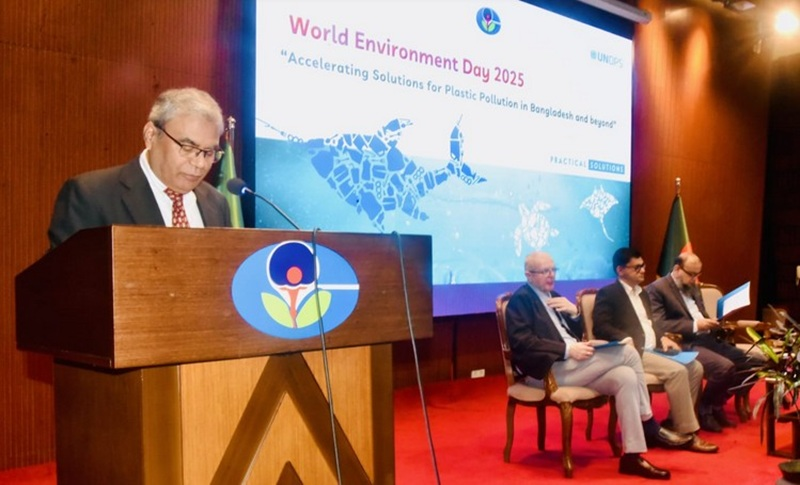- Puppet show enchants Children as Boi Mela comes alive on day 2 |
- DSCC Admin Salam’s drive to make South Dhaka a ‘clean city’ |
- 274 Taliban Dead, 55 Pakistan Troops Killed |
- Now 'open war' with Afghanistan after latest strikes |
- Dhaka's air quality fourth worst in world on Friday morning |
BIMSTEC Calls for United Action on Plastic-Free Bay

Plastic pollution poses a growing threat to the Bay of Bengal region, and coordinated regional action is essential to tackle it—underscored the Secretary-General of BIMSTEC, Indra Mani Pandey, at a high-level dialogue held in Dhaka on Thursday.
“BIMSTEC stands ready to deepen regional cooperation to achieve a plastic-smart Bay of Bengal,” he stated at the seminar, which convened government leaders, private sector figures, youth activists, and international partners to accelerate sustainable plastic management solutions.
The seminar, titled "Accelerating Solutions for Plastic Pollution in Bangladesh", was jointly organised by the Department of Environment (DoE) of Bangladesh, the United Nations Office for Project Services (UNOPS), and BIMSTEC. The event aligned with the 2025 World Environment Day theme and was hosted at the Department of Environment’s conference room.
Sudhir Muralidharan, UNOPS Country Manager for Bangladesh and Bhutan, opened the session, emphasising that plastic pollution is not just an environmental concern but also a challenge of infrastructure and human behaviour. He reaffirmed UNOPS’s commitment to supporting Bangladesh through scalable, regional solutions that can yield measurable results.
Highlighting the urgency of the issue, speakers noted that over 87,000 tonnes of plastic waste enter Bangladesh’s marine ecosystem every year, threatening biodiversity, livelihoods, and public health. The country’s leadership, along with regional cooperation through BIMSTEC and UNOPS, marks a new phase in environmental governance.
The event reinforced Bangladesh’s dedication to its National Action Plan for Sustainable Plastic Management (2020–2030), which aims to reduce plastic waste by 30%, recycle 50%, and eliminate 90% of targeted single-use plastics by 2026.
Discussions focused on innovative financing, behavioural change strategies, and the role of media and the petrochemical industry in driving awareness and change. Participants also explored cross-border cooperation, technological innovation, and green investment to support a circular economy.
Secretary of the Ministry of Industries, Md Obaidur Rahman, stressed the need to embed sustainability within industrial transformation. “This seminar is a step toward aligning environmental responsibility with industrial development,” he said.
Director General of the Department of Environment, Dr Md Kamruzzaman, reaffirmed the agency’s commitment to implementing the national plastic action plan through inclusive, accountable, and cross-sectoral collaboration.
Key outcomes of the event include a forthcoming Joint Communiqué and the launch of pilot initiatives to advance regional cooperation in combating marine plastic pollution.

